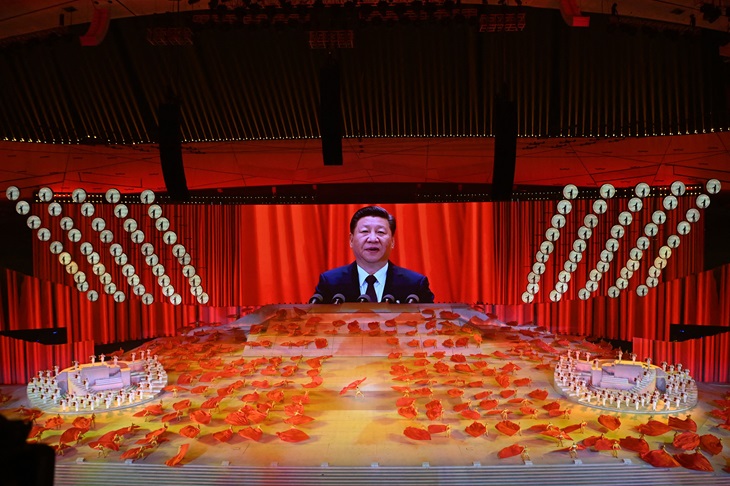Riding on a roll of improved relations with China, which are more to do with President Xi’s concern about the failures of the Chinese economy to bounce back after Covid than anything Australia has done, (or, when one remembers the Morrison government, not done) the Albanese government is keen to make hay while Xi shines. Rather than pursuing the more cautious approach of drawing boundaries around Chinese investment in Australia’s critical mineral resources, Trade Minister Don Farrell announced on the sidelines of the APEC summit in San Francisco that Australia needed investment in critical minerals projects – ‘whether it’s the Europeans, whether it’s the Japanese, the Koreans, the Singaporeans, the United States, or China’.
The Americans, on the other hand, are more cautious and last October President Biden enacted a series of export controls that limited the sale of American semiconductors to China and prevented Chinese companies from buying chip-making equipment from the United States without a license. This was done with cooperation from Japan, the Netherlands, and South Korea. The American embargoes on semiconductors and components will make it harder for China to catch up with American military technology, an area where the United States still has a real advantage. The Australian decision to open the door to Chinese investment in critical minerals will not.
Semiconductors and critical minerals are the new oil for the 21st Century. They are also possibly the source of a new divergence between China and the West, a divergence that could improve the United States’ ability to contain China and ensure altercations between the two do not become destructive conflicts.
Prior to the 19th Century, there was a long period of history where on most criteria the two geographic entities, China and the West were equal. The Song Dynasty (960 – 1276) invented gunpowder and were the first to use it in warfare, and the Ming Dynasty (1368 – 1644) was called, with justification, the first ‘gunpowder empire’ in history. A small divergence between the West and China occurred when, because of different cultures of fortification, the West continued to refine their use of gunpowder and the Chinese did not.
Further divergence occurred when, in Europe, the creation of effective states was dependent on establishing control over domestic space as well as competing successfully against rival states and necessary to both was military prowess. Europe’s military continued to move ahead of China’s. Military technological developments, such as complex bastions and ship-building techniques, would give Europe advantages in their acquisition of colonies, or as was inflicted on China in the late 19th Century, their ‘scramble for concessions’. European advantages in warfare reflected the ‘challenge-response dynamic’, a situation where military innovations stagnated in peacetime and sped up in during times of conflict. The West maintains this dubious advantage; the United States military has plenty of practice at warfare where China’s military suffers from what President Xi calls the ‘peace disease’.
However, more important than the fact that no one knows if the Chinese military can do more than march in time, the next great divergence could come from the West withholding technological knowledge from China and at the same time carefully managing the supply of the critical minerals necessary for the development of semiconductors which play such a pivotal role in military technology. Many countries have critical minerals but given Australia’s precarious position between her major ally the United States and her major trading partner China, it is important for Australia to be seen to be trying to do the right thing. The United States holds firm against China and reiterates the sensible advice from President Reagan given in the dying days of the Cold War – ‘trust but verify’ – but the Labour government is thinking short-term and wishfully hopes, what is really just a brief period of detente, is a more long-term move towards better relations.
This was especially evident in the recent altercation between Australia and China in international waters off Japan. Whilst Australia objected through ‘all the usual channels’ to a Chinese naval ship’s ‘dangerous, unsafe and unprofessional’ behaviour, it seems unlikely that Prime Minister Albanese raised the issue in a face-to-face meeting with President Xi. Instead, whilst benefitting from President Biden’s green energy subsidy scheme, the Inflation Reduction Act, to the tune of $20 billion dollars for Australian critical minerals, Australia is keen to also reap future financial rewards by trading the same minerals with China.
Given high inflation, high rents, and high interest rates which are inflicting real economic stress on people with mortgages, the Albanese government runs the danger of encouraging not only its constituents at home to doubt its intentions but also its allies abroad.
Got something to add? Join the discussion and comment below.
Get 10 issues for just $10
Subscribe to The Spectator Australia today for the next 10 magazine issues, plus full online access, for just $10.

























Comments
Don't miss out
Join the conversation with other Spectator Australia readers. Subscribe to leave a comment.
SUBSCRIBEAlready a subscriber? Log in